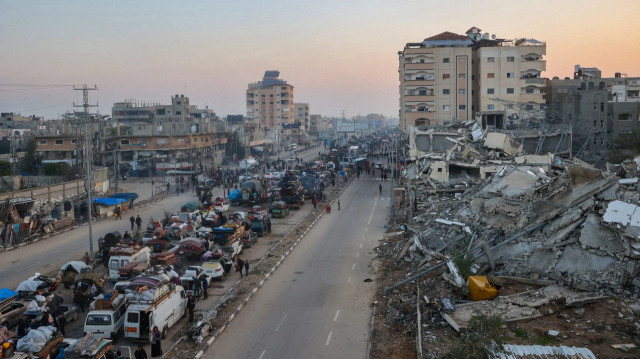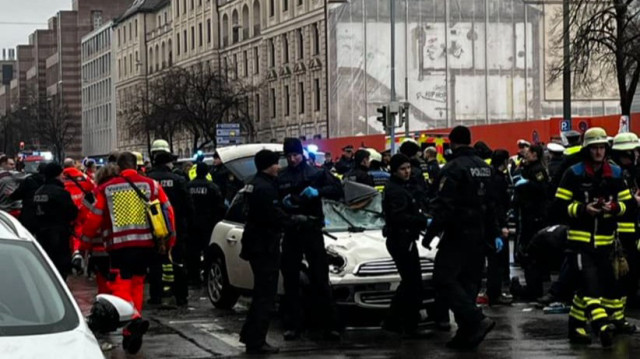Escalating Tensions as Prisoner Exchange Deal Stalls
The fragile state of the prisoner exchange deal between Israel and Hamas has become a contentious focal point as political and humanitarian concerns intertwine in the volatile Middle East region.
Published February 14, 2025 - 00:02am

Image recovered from yenisafak.com
The ongoing crisis in the Middle East has taken a critical turn as a fragile prisoner exchange agreement between Israel and the Palestinian group, Hamas, faces significant challenges and intense scrutiny. Recent developments, reported by multiple media outlets, reveal a complex web of political, humanitarian, and diplomatic issues concerning the exchange of prisoners and hostages.
Reports indicate a looming resolution with the potential release of three Israeli prisoners by Saturday, amidst a backdrop of escalating tensions. Israeli media, particularly outlets such as Yedioth Ahronoth, shed light on the imminent developments, suggesting that the crisis might see a positive outcome. However, this comes in the wake of Hamas's sudden suspension of prisoner releases, adding layers of uncertainty to the already complex situation.
US President Donald Trump's dramatic intervention escalates the stakes, as he warned of severe consequences if Hamas fails to release hostages. Trump's stark ultimatum underscores the difficult position for Israel, which finds itself under pressure both internally and externally. His comments suggest a willingness to support drastic measures, exacerbating fears of potential military escalation in an already volatile region.
Israeli Prime Minister Benjamin Netanyahu, echoing Trump's aggressive stance, threatened to terminate the fragile ceasefire agreement should Hamas not comply by the specified deadline. This highlights the fragile nature of peace in the region, with any breach or delay potentially triggering broader conflict repercussions.
Meanwhile, various reports detail continuous violations of the ceasefire agreement by Israel, as alleged by Palestinian authorities. These include shootings and restricted access to essential relief supplies in Gaza, escalating tensions further. Such actions complicate the humanitarian challenges faced by civilians in the besieged enclave, many of whom are displaced and in dire need of basic necessities.
The prisoner exchange agreement, as initially outlined, involves the release of 33 Israeli hostages in return for hundreds of Palestinian prisoners. This deal intricately ties into the delicate framework of the ceasefire, with each violation potentially unraveling the limited progress achieved.
Complicating matters, legal challenges loom over Netanyahu, with the International Criminal Court having previously issued warrants against him for alleged war crimes in Gaza. Simultaneously, Israel faces genocide allegations at the International Court of Justice, both factors adding international pressure into the mix.
Hamas's unilateral decision to indefinitely postpone the next wave of prisoner exchanges reflects the uncertainty plaguing the fraught agreement. Hamas accused Israel of not adhering to its commitments, a claim that deepens mistrust between the two entities and raises questions about the future implementation of the deal. Statements from Hamas's armed wing, the Qassam Brigades, emphasize adherence to the agreement's terms, conditional on Israel fulfilling its part.
The humanitarian angle took a startling turn with the recent release of three Israeli hostages in severely weakened conditions. This has sparked public outrage and fueled political debates over the handling of negotiations and hostage exchanges. Distressing reports of the hostages' poor health have evoked strong reactions, with Trump comparing their condition to Holocaust survivors, underscoring the emotional and historical weight that colors these events.
In response to the release and exchange challenges, Israel handed over 183 Palestinian prisoners, many in similarly dire conditions. These exchanges, fraught with humanitarian concerns, highlight the broader issue of how detainees are managed and exchanged between opposing factions in prolonged conflicts.
Netanyahu's public comments regarding the hostages' condition and the country's resolve to address such humanitarian crises underscore the delicate balance between political strategy and humanitarian ethics. The Middle East conflict continues to be a highly sensitive issue that challenges the international community's efforts toward peace and stability.






